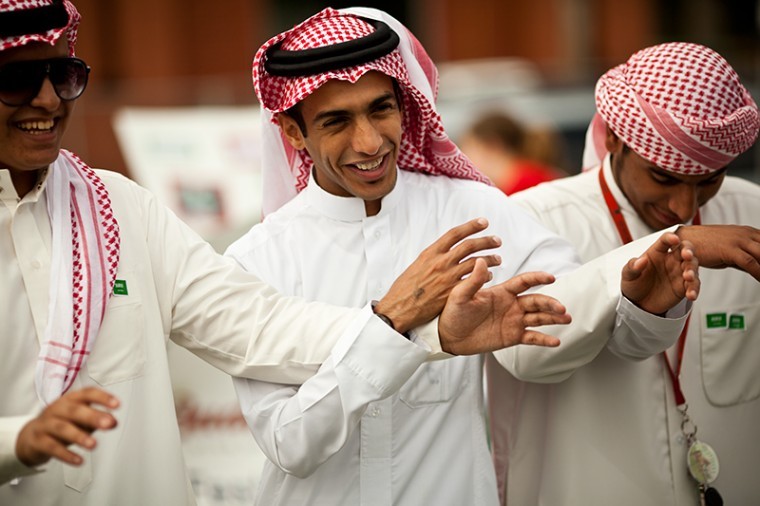Iftar dinners offer more than just food to students, families
July 14, 2015
In the ninth month of the year in the Islamic calendar, 30 days of fasting from sunrise to sunset are observed. The month and the fasting itself are called Ramadan, and the dinner held at sundown is called Iftar.
This year Ramadan began at sundown on Wednesday, June 17 and will end at sundown on Friday, July 17.
As the international student population grows at WKU, the International Student Office (ISO) has been tasked with finding ways to make these students feel comfortable and welcome. One such way the ISO is doing this is holding free Iftar Dinners three times a week during the month of Ramadan for anyone interested—Muslim or otherwise.
Ashley Givan, a sponsored international student advisor and programming coordinator took on the project roughly a month ago, and in less than a week held the first event.
“A lot of our sponsored students and international students in general are from Saudi Arabia and other countries in the middle east that have very large Muslim populations, so we knew a lot of our students here are observing Ramadan,” Givan said. “Our Chief International Officer Raza Tiwana suggested we have some of these Iftar dinners so he asked me to take the lead.”
Givan said that the idea went into motion on a Friday this past June, and by the following Wednesday the first dinner was held. The dinners, which are held on Mondays, Wednesdays and Thursdays, are in the third full week of being held, with Ramadan ending on Friday.
“About a month ago we met with Steve Hoyng, one of the managers for Aramark, some people that work in fresh foods, and a few student representatives. We had one our student diplomats, his name is Ali Alsheef from Saudi Arabia, and a girl named Azhaar Al Bartamani from Oman,” Givan said. “We wanted to get their input because we really wanted to make this work for the students, not for us to just try it and it be something that doesn’t really work.”
When the group collaborated ideas, one of the topics discussed was what sorts of foods the students would like to eat.
Aramark already had the food in its kitchen to prepare the first dinner because the company has been offering a Halal menu all summer. Halal is defined as food, as well as actions and objects that are seen as permissible to eat, engage in or use under Islamic law. The concept is similar to keeping Kosher in Judaism.
“It is not a typical event for us, but we have been doing a Halal menu all summer so the items were on hand in our kitchen to begin with, we ended up just using them for something different,” Steve Hoyng, resident district manager of Aramark said. “That’s the reason we were able to turn around and have this sort of event within four or five days of planning it.”
Another thing Hoyng noted was that because it was the month of Ramadan, the Muslim students wouldn’t be eating from the Halal menu during the day due to fasting, so the food preparation basically just moved from day time to night.
Because the food is offered free to anyone who shows up, the ISO fits the bill from money within its budget, but through WKU’s close relationship with Aramark, food cost has been successfully managed according to Hoyng.
Hoyng estimated the food cost at roughly $3.50 per person, obviously fluctuating depending on how many students show up.
Hoyng and Givan were both quick to emphasize that the event is about more than just Ramadan and breaking fast at sundown.
“(The students) are away from home, a lot of them can’t see their families, and having an Iftar dinner not only makes them feel welcome but also gives them an opportunity to socialize and meet new people,” Givan said. “It is also a great opportunity for students who are not Muslim to come out, try some new foods, make new friends, and learn about their culture.”
With this marking the first year that Iftar dinners have been sponsored by the ISO, Givan and Hoyng were not exactly sure what to expect, and the turnout proved to be far greater than they planned for from day one.
“The first night we were planning on 25-30 showing up, and for us it is like catering, so we generally make about 20 percent more than we are expecting,” Hoyng explained. “So we made food for about 35-40 and about 70 people showed up, which is fantastic for us but we just weren’t expecting that. We have had as many as 100 show up. “
Amongst those in attendance are not only Muslim students but also their family members (for those who have family in Bowling Green) other non-Islamic students.
“The big thing is a lot of these students are away from home and it’s more of a community thing,” Hoyng said. “It is about the food but it isn’t about the food, it is more about a community environment, and that is what we are trying to promote here. If you’re thousands of miles away, but you can still come get a little taste of home, that’s all it’s about.”
With a successful turnout this year, Givan said that she anticipates WKU to continue to offer Iftar dinners in the coming years—“With a little more advanced planning.”













